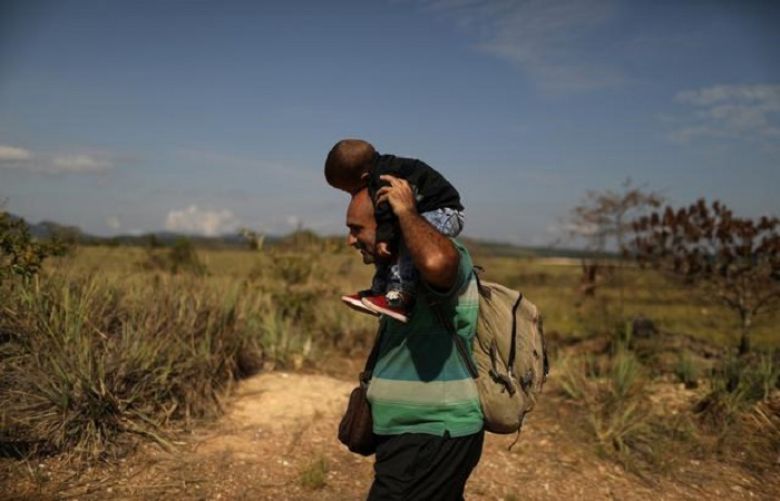Venezuela reopened its border crossing to Brazil on Friday, after its closure for nearly three months forced desperate Venezuelans to use indigenous trails to smuggle food and basic goods or to flee their crisis-stricken homeland.
Venezuelan President Nicolas Maduro closed the only formal crossing between the countries in February to block an opposition attempt to bring U.S. aid in from Brazil and Colombia. Opposition leader Juan Guaido has urged the military to oust Maduro, branding him a dictator, while the government in turn calls Guaido a puppet of Washington and a coup-monger.
Venezuelan Economy Vice President Tareck El Aissami said on Friday the border was being reopened to restore development of the border economy for the benefit of both nations. Witnesses on both sides of the border said traffic started flowing again through customs posts mid-afternoon.
The border’s closure had driven hundreds of Venezuelans to bribe National Guard officials every day to make their way into Brazil along indigenous trails that cross the sun-baked savannah, according to interviews with two dozen migrants and two former National Guard officers.
With roughly a quarter of Venezuela’s 30 million people in need of humanitarian assistance due to an economic meltdown, according to the United Nations, the illicit border crossings provided a lifeline for many in the border region.
The migrants interviewed by Reuters said that Venezuelan National Guard soldiers had taken advantage of the border closure to collect 50 reais ($12.50) per car on the parallel crossings. The tariff was higher for vehicles coming back loaded with rice, flour and sugar, they said.
Those without cash to pay the informal toll must take even longer paths, hauling their luggage on foot for up to six hours, in a desperate trek witnessed by Reuters.
“Wearing Venezuelan uniforms, they brazenly demand money even to pass on foot. They’re raking it in,” said Yeral Garate, as he waited with five other hungry migrants for rice to cook in a pot over a wooden fire on a trail inside Brazil.
A Venezuelan migrant carrying a baby walks along a trail into Brazil, in the border city of Pacaraima, Brazil, April 11, 2019. REUTERS/Pilar Olivares
Neither the Venezuelan government nor the National Guard, which runs border controls, replied to requests for comment. Maduro has in the past said that criticism of the military is linked to opposition efforts to tarnish the armed forces.
More than 3.4 million Venezuelans have left the country since 2015 due to a political and economic crisis, according to the United Nations. Garate said that a lack of food and medicine, miserable wages and Maduro’s “catastrophic” policies drove him to flee.
He said he took a bus to the border from his hometown of Maturin in eastern Venezuela, and then walked 11 miles (18 km) over rolling scrubland to Brazil, with only the few possessions he could carry.
The trip can be easier for those with the means.
Hired drivers offer packages from Puerto Ordaz in southern Venezuela to the border town of Santa Elena de Uairen, 400 miles (640 km) to the south, and then across trails to Pacaraima - with border bribes included.
A reservation for the Pemon indigenous tribe that straddles the border is crisscrossed with dirt tracks along which cars, jeeps, vans, pickups and motor bikes ferry migrants to Brazil and return with goods.
NATIONAL GUARDS
Two National Guard sergeants, who had recently deserted from their posts at the border, said that bribe taking was systematic there and that military officials would compete to be sent to the lucrative postings.
“They charge 50 reais per car to access the trails and 100 reais for larger vehicles. People who bring back lots of goods also have to pay,” one of the sergeants told Reuters in Brazil.
The sergeant said he had defected because he disagreed with the way opposition protests were being repressed in Venezuela. Some six dozen Venezuelan military officers have defected across the border in recent weeks, according to the Brazilian army.
Six National Guard soldiers questioned by Reuters in Brazil said that lucrative bribe taking by military officials at border crossings and other black market activity was one reason that many troops had ignored the opposition’s call to unseat Maduro. All of the soldiers interviewed by Reuters requested not to be identified for fear of reprisals against their families.
A spokesman for Guaido did not immediately respond to a request for comment.
Corruption is one of the main complaints by ordinary Venezuelans, ranging from National Guard shakedowns at checkpoints across the country to allegations of money laundering and graft by senior military officials being investigated by courts in the United States. Maduro’s government has said the cases are politically motivated.
Pacaraima, a town of 12,000 inhabitants that has thrived on Venezuelan demand, was hit hard by the February border closure.
Daily sales of roughly 5 million reais ($1.2 million) to Venezuelans fell overnight to about a fifth of that, said Joao Kleber Soares, head of the local chamber of commerce.
As traffic flowed to the side-trails, however, business had almost returned to previous levels, Soares told Reuters in the bustling main street packed with Venezuelans loading up their vehicles with sacks of food, toilet paper and other goods.
Soares and other entrepreneurs in Roraima state, which borders Venezuela, had pleaded with Venezuela to reopen the border and Roraima Senator Telmario Mota visited Caracas to urge Maduro to do so for business to recover.







